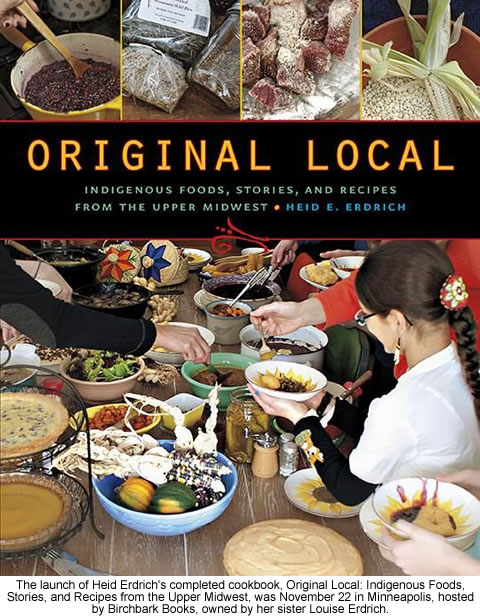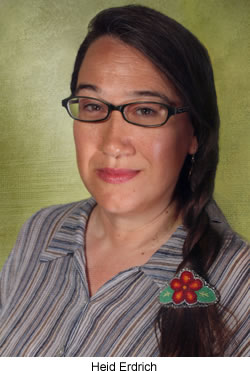 |
Canku Ota
|
 |
|
(Many Paths)
|
||
|
An Online Newsletter
Celebrating Native America
|
||
|
December 2013 - Volume
11 Number 12
|
||
|
|
||
|
Poet Heid Erdrich
Turns Talents to a Cultural Cookbook Celebrating Indigenous Foods
|
||
|
by Konnie LeMay - Indian
Country Today Media Network
|
||
 When
Heid Erdrich observed the growth of the "locavore" movement —
the push to buy and consume locally grown food — she saw a disturbing
lack in an otherwise laudable concept. When
Heid Erdrich observed the growth of the "locavore" movement —
the push to buy and consume locally grown food — she saw a disturbing
lack in an otherwise laudable concept.
"Locavore folks were eating foods long-grown here by indigenous culture groups, but they did not know it," Heid said. "I asked, 'Where did this food come from originally?' It really wasn't of concern to people." As an Ojibwe woman from Turtle Mountain in North Dakota, it was of concern to Erdrich. She believed the indigenous connection should be known. "The local food movement caught on so much especially in Wisconsin and Minnesota and Illinois, but I missed the indigenous element. … That was missing from the conversation." Thus started this poet to creation of a book that would serve up recipes with family food stories, resource information and cultural wisdom as side dishes. The launch of her completed cookbook, Original Local: Indigenous
Foods, Stories, and Recipes from the Upper Midwest, was November
22 in Minneapolis, hosted by Birchbark Books, owned by her sister
Louise Erdrich.
Given climate changes and environmental alterations, she said, "You don't know when that happens if it's ever going to come back." She found hope in the different voices added to her cookbook, the stories and recipes from many regional tribes, including the Ojibwe, Ho-Chunk, Menominee, Potawatomi and Mandan. "By the time I was finishing the book, people told me the harvest was going to be good. Some people's sugarbushes are really coming back." The second challenge was to create a book easily consumed by non-Native readers, but that also evoked in Native readers their own heritage. "I wanted Native people to look at it and to see … recipes and names of ingredients that look familiar and to think back to their family histories, too." Erdrich has her own memories of food and family. "Berry picking has got to be just one of those things that makes me think of being an Ojibwe woman. There's nothing more ikwe than berry picking." Each of the 135 recipes includes a story or an explanation of tradition. The recipes come from family and friends and from recipes "indigenized" from other cookbooks. Erdrich approached this book as she approaches poetry. "Writing about cooking is a lot like poetry to me – interesting and emotional and evocative and condensed. So is cooking itself … themes and carrying certain flavors and matching things together." Original Local is organized by food groups and features specific chapters on what the Ojibwe call manoomin (wild rice) and mandaamin (corn) – two of the most important plants – as well as one on seeds. "I did a lot of use of seeds because we ate a lot more seeds for just thousands of years, and we stopped doing that." Just reading the list of potential ingredients might make some mouths water and make some minds recognize the bounty of this region: Wild rice, corn, bison, cranberries, whitefish, rabbit, sunflowers, quail eggs, duck, beans, squash, venison, wild ginger, wild plums, morel mushrooms … and so many more. Easily accessible substitutes are suggested for ingredients such as duck eggs (use chicken eggs). The book delivers resources for foods sources and information. She explains the heritage context of food sources and the spirits in plants. Erdrich also deals with food as economic and political decisions, choosing foods that stretch a budget and fairly provide for those who harvested it. "Whatever we eat is connected to other people." The cheapest ingredients may not be the best bargain, she said. Compare, for example, the number of meals from one pound of hamburger to one pound of wild rice. Erdrich appreciates how many non-Native people are reconnecting with the land and their foods. "If I can say anything about indigenous cultures, we are land-based; that is common. Now other people are having that urge after several generations. They are learning to respect their environment." In Indian country, meanwhile, she sees good trends: Native people in the Twin Cities creating urban vegetable and herb gardens; the Wisconsin Oneida nation opening its own health food store; and White Earth Tribal and Community College encouraging students to become involved in farming projects. As with so many people, when Erdrich thinks of home, she also thinks of family meals – like the feast being planned for this week. "We have a list of 100 things – games, centerpieces, food. There will be 10 pies and turkey and it depends on what somebody's hunting has been like, maybe fresh venison, some kind of fish – a fish-fry, which is one of my favorites –every kind of vegetable and at least two dishes of manoomin." Her cookbook truly reflects how family feasts come together: "I got a lot of input from a lot of people." Original Local Book Signing and Soup Sampling: Noon-1 p.m. Friday, November 29 Birchbark Books Original Local |
|
|
||
|
|
||
| Canku Ota is a free Newsletter celebrating Native America, its traditions and accomplishments . We do not provide subscriber or visitor names to anyone. Some articles presented in Canku Ota may contain copyright material. We have received appropriate permissions for republishing any articles. Material appearing here is distributed without profit or monetary gain to those who have expressed an interest. This is in accordance with Title 17 U.S.C. Section 107. | ||
|
Canku Ota is a copyright ©
2000 - 2013 of Vicki Williams Barry and Paul Barry.
|
||
 |
 |
|
|
The "Canku
Ota - A Newsletter Celebrating Native America" web site and
its design is the
|
||
|
Copyright ©
1999 - 2013 of Paul C. Barry.
|
||
|
All Rights Reserved.
|
||
 Heid
Erdrich encountered a couple of challenges in writing the book.
The first was a sense of dread as the first two years of her three-year
project brought dismal harvests. "Those two bad years started right
when I started the book," Erdrich recalled. Both the wild rice and
the maple syrup/sugar harvest were meager.
Heid
Erdrich encountered a couple of challenges in writing the book.
The first was a sense of dread as the first two years of her three-year
project brought dismal harvests. "Those two bad years started right
when I started the book," Erdrich recalled. Both the wild rice and
the maple syrup/sugar harvest were meager.